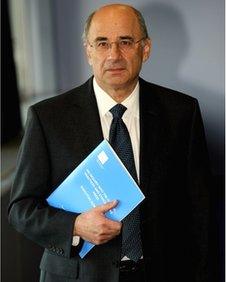Leveson: Scottish Press regulation debated
- Published
Scotland - Johann Lamont reminded us - is not Ireland. From this remark, one could deduce Ms Lamont's underlying suspicion: that the first minister might be seeking to create a constitutional issue out of Leveson.
Alex Salmond had suggested that Scotland might adopt the Irish model of a Press Council with an Ombudsman to pursue cases, real sanctions plus incentives for newspapers to sign up.
Ms Lamont drew attention to the point that Scotland remains part of the UK - and that, under devolution, it remained entirely possible for institutions to be shared across these islands.
Curiously enough, Scotland's status had not escaped the attention of the First Minister. But he insisted that he was not indulging in Nationalist rhetoric for the sake of it.

Lord Justice Leveson delivered his report last week
To the contrary, he said he was acting out of duty. Press regulation is devolved. That means Holyrood must take a view, must act in some way - even if it is simply to pass a Legislative Consent Motion (LCM) and hand the issue back to Westminster.
Plus, as the FM also pointed out in an intervention, for there to be an LCM at Holyrood, there must be an L at Westminster in the first place. Westminster must be ready to legislate - for Holyrood to agree they can do so for Scotland too.
Mr Salmond insisted that he was not precluding debate, not ruling out alternatives - despite outlining his Scottish Press Council plan in an interview with me last week. It was but one proposal, one option.
To the mild displeasure of the presiding officer, Ruth Davidson of the Tories arrived a little late for the debate. But, having apologised, she scarcely drew further breath before launching into a vituperative attack upon the first minister.
He had, according to the Tory leader, already made up his mind. Further to the point, his links with Rupert Murdoch, outlined in Leveson, meant he was not fit to convene cross-party talks. Like the Prime Minister, Ms Davidson wants a UK voluntary set-up without statutory underpinning.
Mr Salmond looked pained, scarcely deigning to stress, again, that Leveson had concluded that in his actions he could not be criticised.
Willie Rennie of the Liberal Democrats backs a UK body, with statutory underpinning. But there was something about the tone of his comments which suggested that he was maybe the readiest of the Opposition leaders to talk to the Scottish government and perhaps even to negotiate. I stress "maybe" and "perhaps".
Mr Salmond plainly thought so too - and apparently drew Mr Rennie aside for a chat at the back of the chamber.
Meanwhile. The Prime Minister and colleagues met newspaper editors in Downing Street to warn them that they had to act fast on a voluntary set-up or there would have to be legislation.
So options? That voluntary deal could go ahead - and might wash over objections at Westminster and Holyrood.
There could be UK legislation underpinning a UK body. There might be Holyrood legislation underpinning a Scottish body.
Or might there even be Holyrood legislation - underpinning a UK-wide regulator?